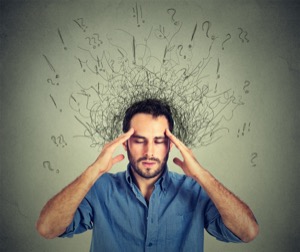- No Fee Unless We Win: (800) 249-3731 Tap Here To Call Us
What is Generalized Anxiety Disorder (GAD)?

Anxiety can manifest in multiple different ways. Generalized anxiety disorder is a common form of anxiety that is classified by the patient experiencing a state of worry and uneasiness, not related to anything, for at least six months.
It is possible to develop generalized anxiety disorder at any age. GAD has similar traits to panic disorder, obsessive-compulsive disorder and other forms of anxiety, however, they all differ.
Living with GAD can be a challenge every day. In most cases, GAD is accompanied by another anxiety or mood disorder. Normally, GAD improves with medication, diet, and psychotherapy. Mediation and learning other coping skills have also been known to help improve the day-to-day life of most patients.
Symptoms of Generalized Anxiety Disorder (GAD)
Generalized anxiety disorder symptoms can vary. They may include:
- Difficulty handling uncertainty.
- Perceiving normal situations as threating, even when they are not.
- Constant overthinking plans and solutions.
- Inability to let go of a worry.
- Difficulty concentrating throughout the day.
- Inability to relax and unwind.
Physical signs and symptoms may also include:
- Insomnia
- Chronic Fatigue
- Trembling
- Muscle aches or tension
- Nausea
- Sweating
- Irritability
Treatment for Generalized Anxiety Disorder
Generalized anxiety disorder has numerous treatments. Each person responds to GAD differently. Interpersonal and supportive therapy can help, while medication has also been proven to help patients. Some people have seen positive results by treating with a combination of the two.
Cognitive behavioral treatment (CBT) targets thoughts, physical and behavioral symptoms such as over-preparation, avoidance and over-planning. All therapies help people change their relationship and how they cope with their symptoms. They also help patients understand anxiety and to not fear the presence of it.
Meditation, exercise, yoga, relaxation techniques and other alternative treatments may also become a part of a patient’s treatment plan.
Your Generalized Anxiety Disorder Disability Claim
As part of an assessment, you will be evaluated on whether your anxiety disability results in a complete inability to function independently outside of your home. You will be assessed for overall ability, or lack of ability, to carry out basic work-related tasks. You must show that your symptoms will last for a year or longer.
It is very important that you carefully document your diagnosis, symptoms, and job tasks that produce anxiety. This documentation must reflect the level of inability to perform normal activities of daily living, concentrate for long periods, interact socially, and function intellectually.
To maximize your chances of winning an anxiety disability claim appeal, it is critical to use appeal attorneys experienced and knowledgeable with the process. Our attorneys are board certified in Disability. We are here to help you gather and prepare all the necessary documentation, give you unquestionable support, and present your case in the most advantageous way to win the disability benefits you deserve.
If you have filed or are preparing to file an individual or long-term disability insurance claim – or if your benefits have been wrongfully delayed or denied – Mehr Fairbanks Trial Lawyers can help you retain your rights and benefits today by calling Toll-Free: 800-249-3731.



















